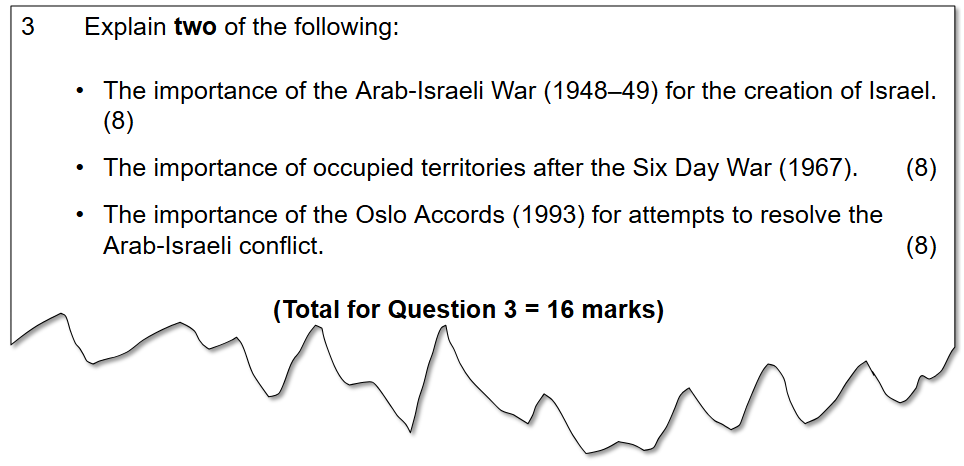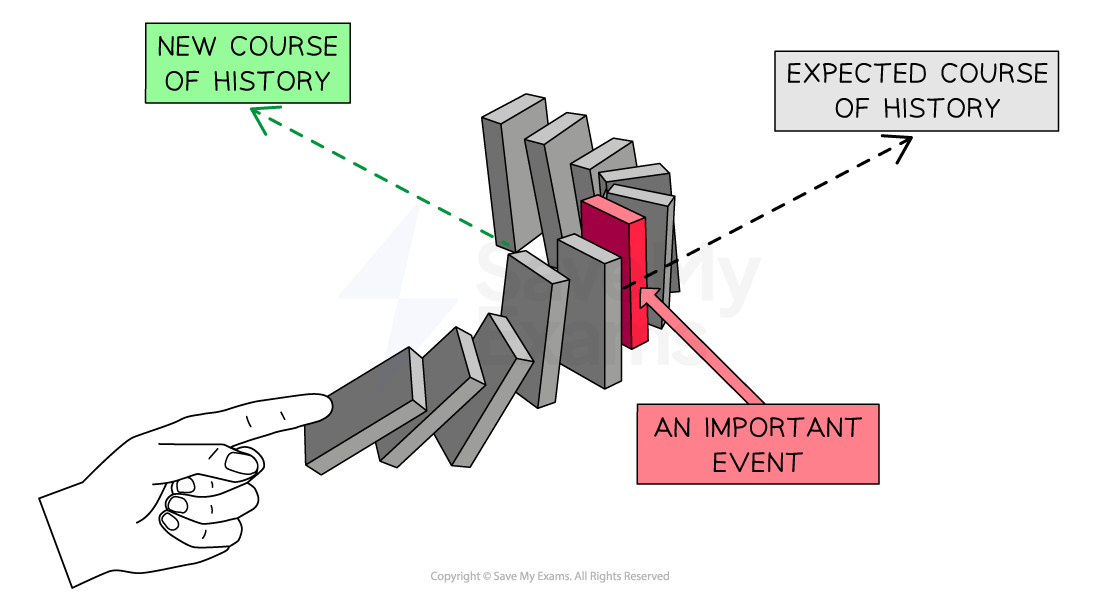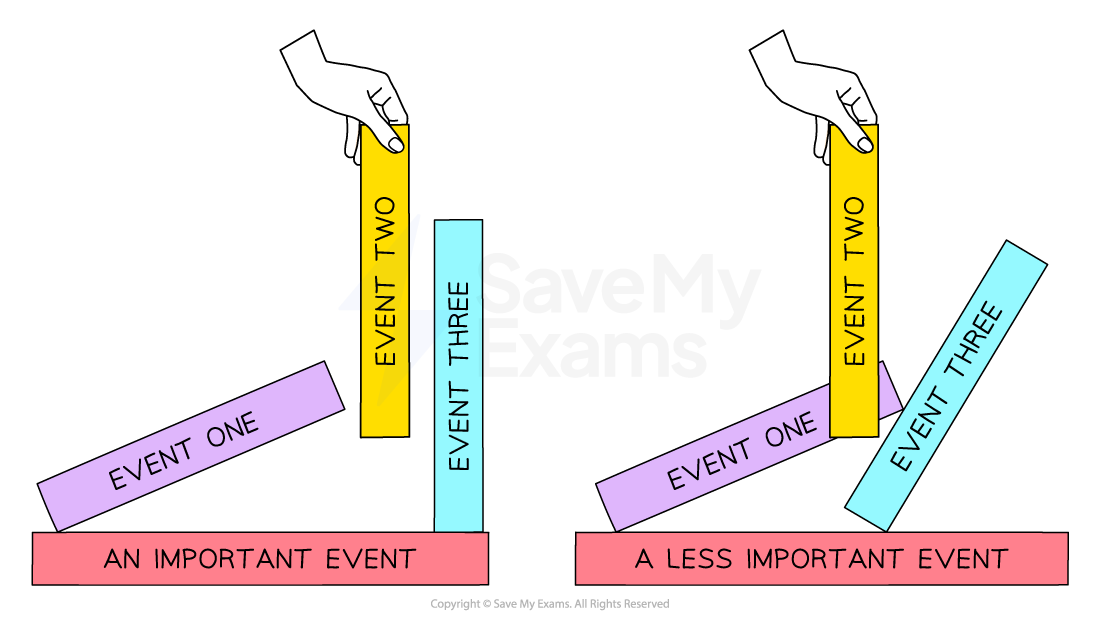The 16 Mark "Explain the Importance of " Question (Edexcel GCSE History): Revision Note
Exam code: 1HI0
Summary of Question 3
Question 3 requires you to explain why a particular event was important for a key theme, such as tensions in the Middle East
You’ll be given three options
You must answer two
Each option is worth 8 marks
This question will require you to use second-order concepts in your answer
Amount of marks | 16 (2 x 8 marks) |
|---|---|
The time that you should spend on the question | No more than 25 minutes |
An example of the type of question you may encounter can be seen below:

In previous years, this question has focused on the following topics in Conflict in the Middle East:
Year of exam | Question topic |
|---|---|
2018 (opens in a new tab) | Option one: Nasser for leadership of the Arab world Option two: The occupied territories for Arab–Israeli relations after the Six Day War Option three: The end of the Cold War for attempts to find a solution in the Middle East |
2019 (opens in a new tab) | Option one: The Israeli Defence Forces for the protection of the new state of Israel Option two: The USSR and the US for the outbreak of the Six Day War (1967) Option three: PLO activities in Lebanon (1970–82) for Israeli security |
2020 (opens in a new tab) | Option one: UN Resolution 181 for the creation of Israel Option two: The Law of Return for the development of the state of Israel Option three: Kissinger’s "shuttle diplomacy" for diplomatic negotiations in the Middle East |
2021 | No paper available |
2022 (opens in a new tab) | Option one: Territorial changes in the aftermath of the 1948–49 war for Palestinians Option two: The PFLP airplane hijacks for international attitudes towards the Palestine issue Option three: The Yom Kippur War (1973) for Israel’s relations with Egypt |
2023 (opens in a new tab) | Option one: Conflicting interests of Jews and Arabs for the end of the British Mandate Option two: The oil crisis (1973–74) for diplomatic negotiations in the Middle East Option three: The Israeli invasion of Lebanon (1982) for the Palestinian Liberation Organisation (PLO) |
2024 | Option one: The end of the British Mandate (1948) for the creation of Israel Option two: UN Resolution 242 (1967) for relations between Israel and the Arab world after the Six Day War Option three: Arafat renouncing terrorism (1988) for attempts to find a solution in the Middle East |
How to explain importance
Importance is a key second-order concept in history
Second-order concepts allow you to:
Understand history
Have a complex explanation
Historical importance is often subjective
Each historian brings their own opinion on what events or people are important
Importance is decided using hindsight. An event is considered important if it:
Created new ideas
Directly changed events at the time
Affected large groups of people
Impacted key themes of the time period, such as:
Tensions in the Middle East
Relations with the Arab world
Had important long-term impacts that can be seen today
To understand importance, visualise a set of falling dominoes
An important event, development or person changes the direction of all of the dominoes that come after it

Imagine the set of dominoes again
An important development, event or person, when taken out of the sequence, stops other dominoes from falling
If it is less important, it does not stop the dominoes from falling

How to answer an "Explain the importance of" question
You must only select two of the three options
If you only answer one of the questions, you will only be able to achieve a maximum of 8 marks
Choose the two options for which you can:
Recall accurate, specific knowledge
Explain why that event mattered for the theme
Give two developed points per answer
Examples of themes for the question are:
Relations between different groups in the Middle East
A couple of examples of this theme include Israel and Arab states (such as Egypt and Syria); Israelis and Palestinians
The creation and protection of the state of Israel
Did the event help Israel become a state or threaten its existence?
International involvement in the Middle East
A couple of examples of this theme include peace talks; the role of the US and the USSR in wars
Terrorism
How did terrorism change international perceptions of the Middle East?
Attempts at peace and diplomacy
Some examples of this theme include Sadat’s visit to Israel; Camp David; the Oslo Accords; US "shuttle diplomacy"
If you do not explain the importance of the event to the key theme in the question, you will be limited to 2 marks per option that you answer
"Explain the importance of" question structure
Your answers could be written in PEE paragraphs:
P — Make a point about the question
E — Include evidence to support the point you have made (K)
Focus on the event mentioned in the question
E — Explain the question (SOC)
Focus on the key theme of the questions
Include a complex explanation showing your understanding of importance
To achieve full marks for one option, you should aim to write two paragraphs
4 marks for each question are awarded for knowledge (K)
4 marks for each question are awarded for your analysis of second-order concepts, consequences and significance (SOC)
Be sure to:
Put a cross in the box next to your chosen option
Answer in the correct space on the paper
Only answer two options
You will not have time to answer all three options, and you will not get any extra marks for doing so

Worked example of an "Explain the importance of" question
Worked Example
Explain two of the following:
The importance of the Arab-Israeli War (1948–49) for the creation of Israel. (8)
The importance of the occupied territories after the Six Day War (1967). (8)
The importance of the Oslo Accords (1993) for attempts to resolve the Arab-Israeli conflict. (8)
(Total for Question 3 = 16 marks)
Answer:
Indicate your FIRST choice on this page.
Indicate which question you are answering by marking a cross in the box. If you change your mind, put a line through the box and then indicate your new question with a cross.

One reason the occupied territories were important is that they worsened relations between Israel and the Arab states (SOC). After the war, Israel took control of land from Egypt (Sinai), Syria (Golan Heights) and Jordan (West Bank), which included East Jerusalem (K). These losses angered the Arab world, especially because the land was home to many Palestinians. This was important because it led to the Arab states refusing to recognise Israel and demanding the return of the territories, making peace harder to achieve (SOC)
Another reason they were important is that the occupied territories became the central issue in Israeli-Palestinian relations (SOC). Many Palestinians now lived under Israeli control in Gaza and the West Bank, and the start of Israeli settlements created more tension (K). The continued occupation led to increased violence and shaped all future peace negotiations. This was important for relations because it made both sides feel threatened by and suspicious of each other, keeping the conflict alive for decades (SOC).
Indicate your SECOND choice on this page.
Indicate which question you are answering by marking a cross in the box. If you change your mind, put a line through the box and then indicate your new question with a cross.

One reason the Oslo Accords were important is that they were the first time Israel and the Palestinian Liberation Organisation (PLO) agreed to recognise each other and work towards peace (SOC). Before this, Israel saw the PLO as a terrorist group, and the PLO did not recognise Israel’s right to exist (K). The Oslo Accords changed this by getting both sides to agree to peaceful negotiation. This was important because it created hope for a two-state solution and set a foundation for future peace talks (SOC).
Another reason the Oslo Accords were important is that they gave Palestinians partial control over areas of the West Bank and Gaza (SOC). The Palestinian National Authority was created to manage education, policing and local services (K). This was important for peace because it gave Palestinians more say over their own lives and reduced direct Israeli control in some areas. However, tensions in this region remained, causing Palestine and Israel to continually argue over the region (SOC).

Unlock more, it's free!
Was this revision note helpful?